#bbc staged spoilers
Explore tagged Tumblr posts
Text
S2 of Good Omens ended the way S3 of Staged did.
They're both split screen
They're both effectively motionless with the camera focussed on their faces, while action continues around them
They both end with Michael/Michael's character choosing to leave
#I dont have any other thoughts on this but I'd be buzzing to read others#& it was interesting to notice#just finished binging s3 of staged#good omens#staged#bbc staged#bbc staged spoilers#good omens spoilers#good omens season 2#staged season 3
83 notes
·
View notes
Text
omg ok I finally watched all of Staged
OW MY FEELINGS jesus that ending
how did they manage to craft an ending that was both heart shattering and hopeful what the fuck lol
22 notes
·
View notes
Text
Save a horse ride a cowboy sooooo…. Saddle up, Sheenie! 🤠
#michael sheen#staged#bbc staged#staged bbc#good omens#aziraphale#crowley#azicrow#aziracrow#azirowley#good omens fanart#good omens spoilers#neil gaiman#bbc#fan edit#video editing
225 notes
·
View notes
Text
I just started watching Staged for the first time and let me tell you, the fact that Michael and Aziraphale give the same silent treatment is KILLING ME!
This is so cute; I can’t-
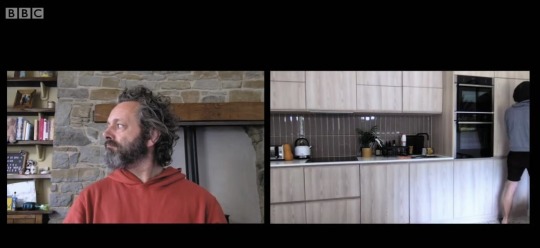
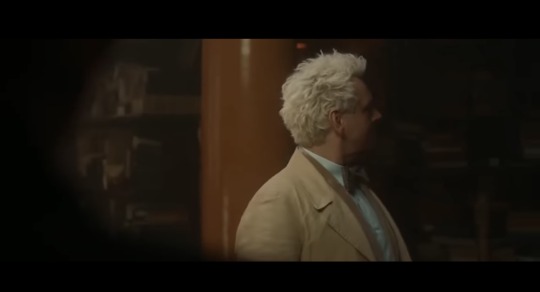
Staged: 1x3
Good Omens: 2x6
#staged#michael sheen#david tennet#bbc#bbc staged#staged bbc#crowly x aziraphale#azirowley#aziraphale#crowley x arizaphale#crowley#ineffable spouses#ineffable husbands#good omens#good omemes#go2 spoilers#go2#go 2x06#go2e6#good omens 2#good omens cast#good omens amazon#good omens aziracrow#good omens aziraphale#good omens crowley#amazon#amazon studios#amazon prime#good omens season 2#good omens s2
230 notes
·
View notes
Text
now Michael Sheen can never tell David Tennant he's not Doctor Who again!! his doctor is out there forever just to troll Michael.
#doctor who#dw spoilers#dw 60th#the giggle#david tennant#michael sheen#staged#david fucking tennant#michael fucking sheen#bigeneration#tennant doctor#14th doctor#doctor who spoilers#doctor who special#bbc staged#dw
121 notes
·
View notes
Text
The Doctor to The Toymaker
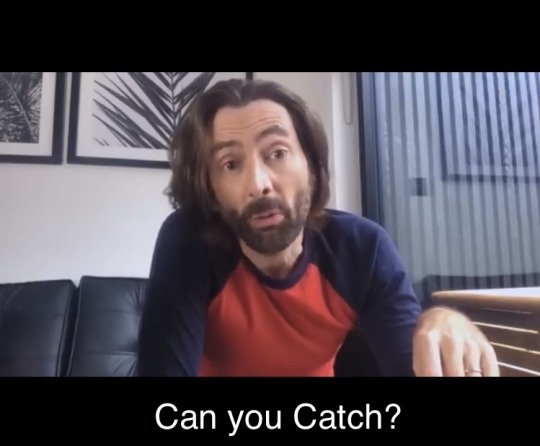
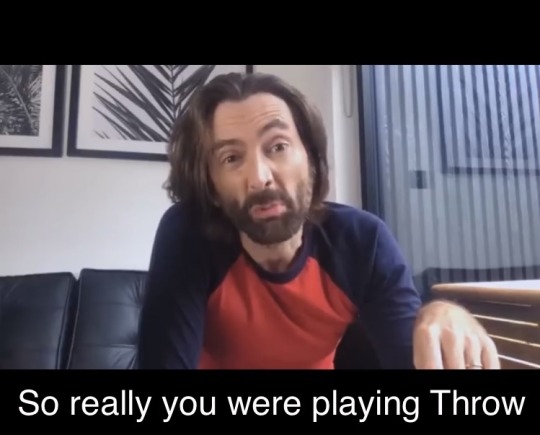
#doctor who#dw#doctor who spoilers#dw spoilers#doctor who 60th specials#david tennant#14th doctor#fourteenth doctor#15th doctor#fifteenth doctor#ncuti gatwa#staged#bbc staged#staged bbc#catch#throw#dw 60th#the giggle
41 notes
·
View notes
Text
Ascending to a whole new plane of insanity right now <- watched ofmd S2 and then ghosts S5 consecutively and will never ever ever get over it
#nothing in my brain now but those monkey cymbal crashing things (BAP BAP BAP BAP BAP CRASH SHSHSHHSHSHHHHH BAP BAP) you get my gist#also i started staged which is just unhinged. im loving it#i need to bite things#im becoming feral im becoming wild#i am no longer fit for society#never okay again. never normal again#i need to BITE something seriously actually#maybe its the autism#bbc ghosts#ofmd#our flag means death#ghosts#ofmd s2#bbc ghosts s5#bbc ghosts spoilers#ofmd spoilers#? i guess
22 notes
·
View notes
Text
I do love that the end of Staged is that nothing lasts forever (affectionate), and the end of good omens s2 is that nothing lasts forever (derogatory)
#just a weird thing i noticed#staged#bbc staged#good omens#good omens s2#good omens 2#good omens s2 spoilers#written in stone
26 notes
·
View notes
Text
I made the mistake of watching Staged like a week after good omens 2. 😭😭😭 Michael I can't keep watching you break up with David. It's too sad.


Good Omens S02E06 // Staged S03E06
They are sick and twisted for this
(insp)
#good omens#good omens 2#good omens spoilers#ineffable husbands#aziracrow#staged#michael sheen#david tennant#gos2 spoilers#staged tv show#Aziraphale#Crowley#THEY MADE STAGED 3 AFTER FILMING GOOD OMENS 2#good omens 2 spoilers#go2 spoilers#gomens#good omens season 2#bbc staged#staged bbc
1K notes
·
View notes
Text

☆ TEA'S NEW AND IMPROVED INTRO POST ☆

Hello! You can call me Tea or Albert. Other nicknames are cool too! I'm a rather private person so neither are my real name. My pronouns are She/Her/They, and I am one of them queers. I mainly reblog, but on occasion you may see some of my incoherent ramblings, or even some of my art. I promise I will get to tagging all of these one day, but for now it will be like a fun little surprise whenever you find something of value here

Some quick and important notes:
I've had a major bot problem recently, so when following me please know that if you have no description, profile picture or title etc. I will block you. Even just one of these tells me you aren't a bot. Make a little post that says hello, and that's good enough:)
I will not be answering any donation asks
Here's why:
-I am a minor and therefore cannot support your cause even if I want to
-I'm literally broke
-My follower count is too small to argue I could promote the cause by answering, and many are in the same situation as me
-It sounds mean, but if I answer one, my inbox fills with 5-10 new asks, and I can't do that.
Tl;dr: I don't have money, and no way to give it if I did.

My interests!
Some favourites:
-Jujutsu Kaisen
- Moriarty the Patriot
- Death Note
-Persona (currently playing through 4)
-Ace Attorney
-Omniscient Reader's Viewpoint (though I haven't finished it, so no spoilers please)
-Totk/Botw
-Saiki K
-Attack on titan
-Alien Stage
-Cult of the lamb
-Sky: Children of the light
-Neon Genisis evangelion
-Howl's moving castle
-Tokyo Ghoul
-Sherlock (The ACD books, though I've watched some of the BBC version)
-Portal
-Many many more, if you ask there's a good chance I will have at least heard of whatever you're talking about :)
Some Favourite Characters:
-N Harmonia (Pokemon B/W)
-Howl (Howl's moving castle, especially the books)
-Suguru Geto (Jujutsu Kaisen)
-Gojo Satoru (Jujutsu Kaisen)
-William Moriarty (Moriarty the patriot)
-Era of the Wilds Link (Botw/Totk)
-Misa Amane (Death Note)
Favourite Music artists:
-Malice Mizer
-Kikuo
-Maretu
-Cö shu nie
-Österreich
-All the persona osts
-Alnst ost
-Miracle musical
Progress on watching/reading things etc (LAST UPDATED: 22/5/25):
-Orv : roughly chapter 70, up to date with the webtoon
-Aot : early s2
-Persona 4 : Apprehending/rescuing the kid in the video game themed dungeon
- Bsd : S3 ep 4
-The Case Study of Vanitas : Episode 8
-ENA : episode 4 (I believe)
-Arcane : Just into s2
-JJBA : I think episode 11 or something of battle tendency

Some mutuals I care rather a lot about:
@sssssaaaaaaammmm - Evil Wizard @wondersoftheimagination - Parent of my late slug son (Rip Ryuzaki)
@y0url0calcryptid - Silly clown
@fearofgodandtolkien - someone I cannot imagine as a person, only as a whole forest
@mehtoohardtofindasuitablename - the owner of the most darling cat in the world
@liquidpaperfoundation1 - very wowzers type of guy
@numberoneah-duofan - I have never been bribed quite so much in my life as I have by this person in the last two years or so
@lara-prim07 - Satorboo <3
If you aren't tagged here I still love you I just don't want to be yapping too much, or I'm not sure about your thoughts on being tagged in this way :) any mutuals who wish to be added (or removed!) Js let me know!

Some trivia under the cut! (Idea from @y0url0calcryptid)

-My favourite colours are purple and red
-I LOVE BUGS
-I love steam trains <33
-My current manga collection consists of all tokyo ghoul, tokyo ghoul:re, volumes 1-17 of mtp, 1 tpn, 1 Mr villains day off, all death note, 2 jjk
-I'm stereotypically english, in a sickly victorian child kind of way
-my favourite animals are giraffes and crows
-when I was younger I really wanted to be an author, but I haven't written anything substantial for a good while, aside from assignments
-growing up I developed an obsession with poisons and diseases that was pretty cool
-chat I love trains
-I'm awful at all sport, but I do aerial hoop and silks, and i love swimming
-I love forests so much
-I play piano (~grade 3-4), but I've been meaning to learn electric guitar
-My spice tolerance (in a metaphorical and literal sense) is negative (stories or food)
-My MBTI is enfp (tragically the same as Shinji from nge)
-I'm a yapper :(
-I'm planning to make an oc masterlist soon!

29 notes
·
View notes
Text
okAY welcome back to episode 4 of stage/fright watchalong... writing this on the day where i've lost an hour's sleep thanks to british summer time feels apt...... episodes 5-6 (and maybe 7) AKA SEASON FINALE this week..... wtf
sorry this is sO LATE
4 times and there's still new stuff i'm noticing!!! everyone bow down to the kings
firstly so fun to meet @donotbelasagne (thanks to a sale of @wintersoulwitch's ticket hehe)!!! thank u for sharing tales of other rs interactions and also bringing the amazing text post printouts for R&S to sign (aka troll you given that they both signed a different one) hahaha
charlie n i also deliberated what we're all gonna do with our lives between next sunday and the putative autumn tour and concluded it's just gonna be going back to watching the blue ring for approx 5 months
spoilers for stage/fright 28/03 evening show below!!
le general observations
ok well my observation re hyped up audiences being crucial to the show was confirmed....
this was a friday night and the crowd was good but where was the whooping and hollering at the beginning?? where was hugo's applause for the elements song???
if charlie and me had been sat together maybe we would have brought the house down but as it was i wasn't going to be the one losing it in the front row lol
many of these observations are new because front row adds a whoooole new perspective to the show
anyway it's still amazing and the cast are having a blast and just ❤️❤️❤️
i'm actually going to write an insanely long read about the whole production once the run is over because i have Too Many Thoughts
act 1
reece's character in the opening theatre scene (haig? i'm gonna call him haig bc house divided) actually gets so angry at angus and is mouthing all kinds of shit at him in that first scene
also literally the first hint of physical comedy from rs comes with that ridiculous cross and uncross of legs that he does i mean like pls
someone in the front row started clapping at the "chekhov's pun" line when steve tries to rile up the crowd and steve just looks down at him and shakes his head like "nah that's too much" lol
BCDR was pretty much the same as the last times i've seen it - tho i'm p sure reece flubbed the drake and shelby line a lil bit... we'll blame fucking little toby xox
danny baker as hostage tbh went way over my head but the boys seemed to be having a ball..... danny was pretty funny being like "you only said i'd be on for one fucking minute", "i was on bbc one, not that you'd have any fucking idea about that" lmao
reece/tommy/eddie went SO OTT on the picking up the phone bit, like literally got right up in danny's face
i feel like it's not even anything to especially highlight now but yes reader, you guessed correctly, reece spends like 90% of this part corpsing
steve is dialling up the celery bit up like 10% every single time now so it's even more absurd than the last time and is just the last straw for reece hahaha i cannot WAIT for how they do this on closing night
i have thought this every time obv but not explicitly called it out - reece singing brown bottles is?? so wonderful???
interval thoughts
reece's eyes are SO BLUE i'm literally shaking buy him brown contacts pls
act 2
ok so i kNEW that in this seat would be exceptionally close to (1) hugo's whole wheelchair scene and (2) marcus when he's crouched down watching the trepanning..... and these scenes were highly enjoyable at such close range!!!
i've already declared my love for hugo but i'll do it again. hugo i love you
finally spotted how they do madam cragg's gubbins!! it's always been too quick for me to suss it out before
HAHA oh my god in the scene where marcus is giving everyone notes you literally see in the notebook he's holding that he has 'marcus' with two massive ticks written next to it
i still maintain that honestly one of the scariest moments in the whole show is when abby is filming the auditorium and then it cuts to the empty seats.... the collective gasp of the audience is always so dang sweet
i mean shout out to the whole cast OBVIOUSLY but special mentions this time go to
1. bhav joshi, who obviously doesn't have that many lines (hur hur) but he is so fking good as the warden.... also if u watch him in the scene when they bring all the techies on, the way he's glaring at them is honestly hilarious
2. anna francolini the actress that you are..... in the first (fake) curtain call she is actually crying!! like full tears running down her cheeks!!! masterful
stage door
there was generally less going on this time and also r had somewhat dialled down the life-threatening levels of cunt-serving to normal levels (i.e. he wasn't in that dark ensemble) so i had maybe 2% more composure this time
my sharpie was being a little temperamental and i did notice that steve still spent an extra second or so making sure he could still do his signature 'X' as part of his sign..... love u steve, the man understands fan service
i'm still in awe that they do this basically every single night and make a point of signing and talking to everyone..... for those who saw my much ado about nothing stage door experience this is actually so rare and we are very lucky 🙇
these posts are honestly becoming more of a diary for me than anything else LOL so props to u if you read them
#stage/fright#stage fright#inside no 9#inside number 9#stage/fright spoilers#reece shearsmith#steve pemberton#in9
32 notes
·
View notes
Text
You couldn’t have put that more perfectly. I think the ending was perfect in the way that it was what was needed. Of course I’m not saying it was flawless — there were definitely imperfections — but that just makes it so right.
We’re meant to be upset about the ending. It was never going to be perfect. Because this show is ultimately about life, and life is far from perfect. It’s about death. It’s about endings. It’s about new beginnings. It’s about family. It’s about love. It’s about pain. It’s about change. But most importantly, it’s about how whatever happens, things will eventually be okay.
And that’s what this ending did perfectly. We may upset about this ending, but we will all eventually be okay. It may take time, but we will be alright, we will get over it, we will heal from the pain. Much like how things are okay for the ghosts in the end. They still get to see their family, and the plague ghosts get a bloody steam room (they lucked out fr). Things have changed, and it’s natural to miss how things were before, but in the end, everything is going to be okay. If there’s one message that the finale really hammered home, it’s that one.
And that is what makes this show so special to me.
had some more time to think, and i want to make it clear that i’m not actually disappointed that alison and mike left. yes, initially it felt a bit jarring considering the end of 5x06, julian’s speech, deciding to stay, loving it there etc etc. i also couldn’t imagine the ghosts being okay with the hotel but then i reconsidered and thought of how they’d get over it, realise what perks it has, be nosy and interested as always, and know they had proposed it for alison’s sake. sure it would have been a dream if they could just stay all together and compromise on space, but i suppose the whole point of it was family are sometimes just a bit shit at that however well-meaning and the only solution is to get some space from them. mike’s mum was there to hammer that point home, even if i think it was rushed. and i moved out of my family home a few years ago so i know all this to be true, i visit my family all the time and that space apart doesn’t stop you being family, of course it doesn’t.
alison and mike had to put their needs first and prioritise attention to mia, rather than what the ghosts want to watch on tv or turning pages of books, and it is very in-character of the ghosts - who have grown so much thanks to alison - to be the ones to propose they leave. it was also lovely to see that they kept their room and visited into their old age. all of that is tonally very on-brand with the idiots and their work.
my gripes come from the pacing, which is so hard to do in 30 minute episodes but something i feel slipped in s5 particularly - time spent on certain things that could have been better allocated elsewhere. and i just would have liked a little bit more weight on the goodbye, maybe, let it linger a bit. of course you can then argue that, well, it wasn’t really goodbye, just see you later, but still. end of an era and all that. do we really need to see what the interim was like, what they did? no, we can infer that, it’s the same old alison and her ghosts they would always be. i just wanted literally another few minutes with them as they were. idk if that makes sense.
i thought it was weird that alison so readily agreed, but then it’s like, well maybe she knew it was just time. they all knew but she wanted to keep them all a bit longer, hang onto that dream. the ghosts being the ones to encourage her to go rather than hope she’d stay was the final push she needed to accept things finally were going to change. everything changes. the ghosts know that more than anyone because they’ve seen so much of it.
i did absolutely love the parallels of them leaving vs arriving, alison’s outfit and the car on the drive. so many shots were call-backs to the first episodes and i loved that dearly as a bookend.
ultimately, the ghosts weren’t forgotten and they didn’t get sucked off. they were visited for decades, got to have loads of new experiences with a hotel no doubt, got to watch alison and mike’s kid(s) grow.
i have a lot of feelings and it was bittersweet and imperfect in places but ultimately it was one of the kindest endings they could have given everyone bar alison and mike simply just staying, which in the long run just wouldn’t have been viable.
fuck. ok
#bbc ghosts spoilers#bbc ghosts#bbc ghosts meta#sorry for the essay#but I had to say something#I think I’ve reached the fifth stage of grief: acceptance
215 notes
·
View notes
Note
The Graham Norton Show and Cait just started following each other. Hoping she'll be on the show soon.
Thanks for the message, Anon. 😃 She’s not listed among the guests for the balance of 2024. Let’s hope she shows up on Graham’s stage in the new year. 🥳
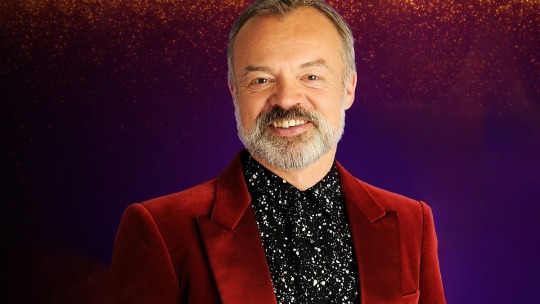
The Graham Norton Show / BBC
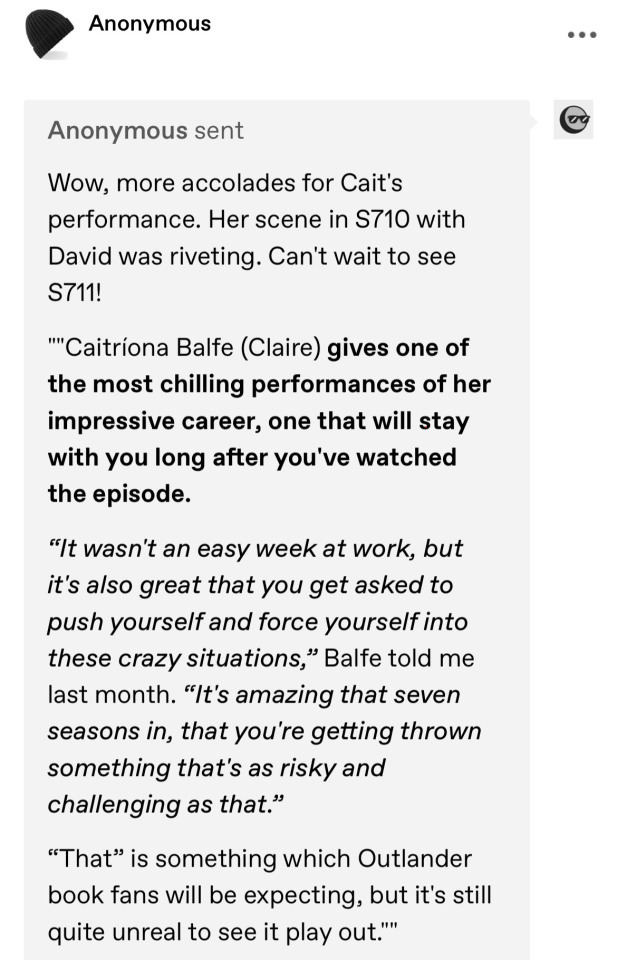
Thanks for the message, Anon. 😃 I watch Outlander on someone else’s schedule, so have only just seen Brotherly Love. I always enjoy watching Claire/Lord John scenes, and look forward to more of them… my dear. 😉
🚨 Spoilers ahead for S07E11 A Hundredweight of Stones
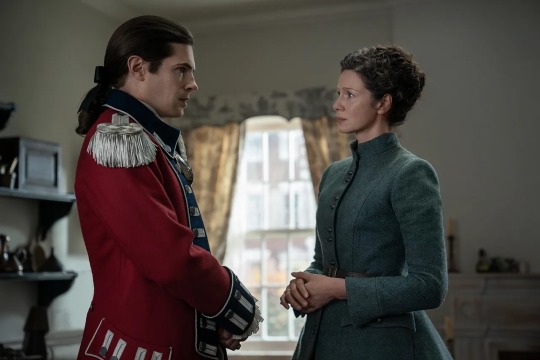
Things are about to change for Lord John and Claire. Robert Wilson/Starz
What to Watch the Week of December 1: Outlander's Most Jaw-Dropping Episode Yet
Get ready for Outlander to devastate, shock, and surprise you in one of the most explosive hours of TV yet. Following this past week's episode (in which Claire got some devastating news...no spoilers it you're not caught up), we enter episode 711 with Claire's life in shambles, Roger and Buck no closer to finding Jem, and Brianna ready to do battle with anyone who comes between her and her family.
When I previewed the new (half) season of Outlander in this guide a few weeks ago, I teased its gut-wrenching and raw return and this episode is why. Caitríona Balfe (Claire) gives one of the most chilling performances of her impressive career, one that will stay with you long after you've watched the episode.
It wasn't an easy week at work, but it's also great that you get asked to push yourself and force yourself into these crazy situations," Balfe told me last month. "It's amazing that seven seasons in that you're getting thrown something that's as risky and challenging as that.
"That" is something which Outlander book fans will be expecting, but it's still quite unreal to see it play out. Come back to Glamour on Friday, December 6 to read more of what Balfe has to say as well as Sam Heughan's thoughts and more from executive producers Maril Davis and Matthew B. Roberts.
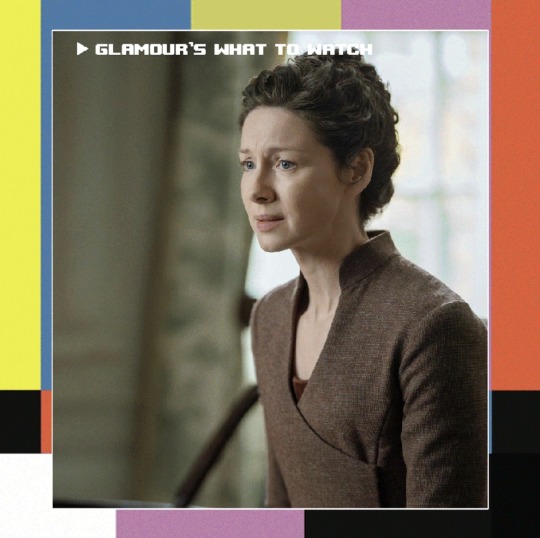
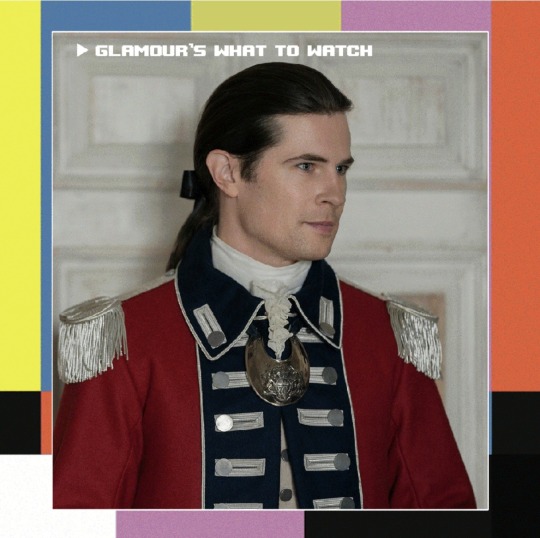
Glamour
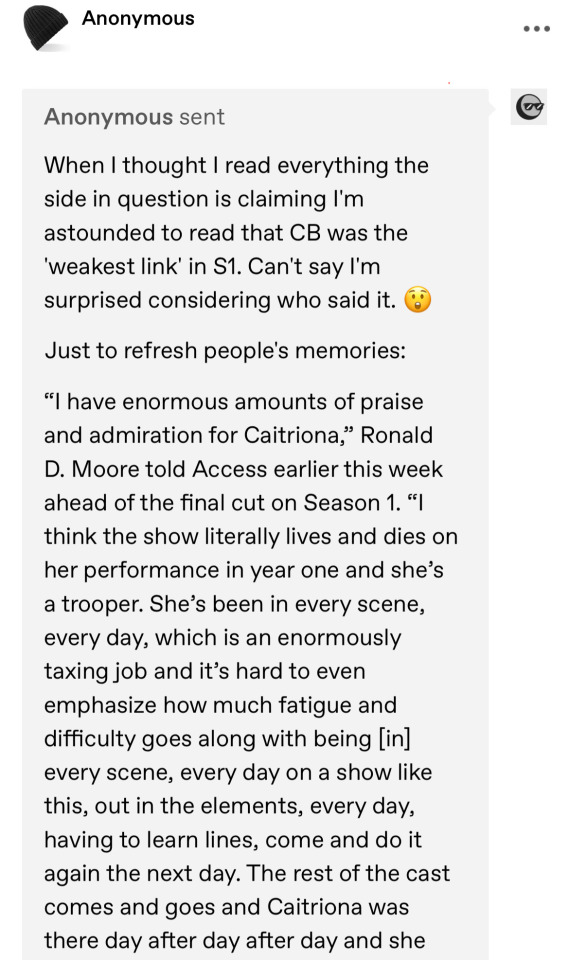
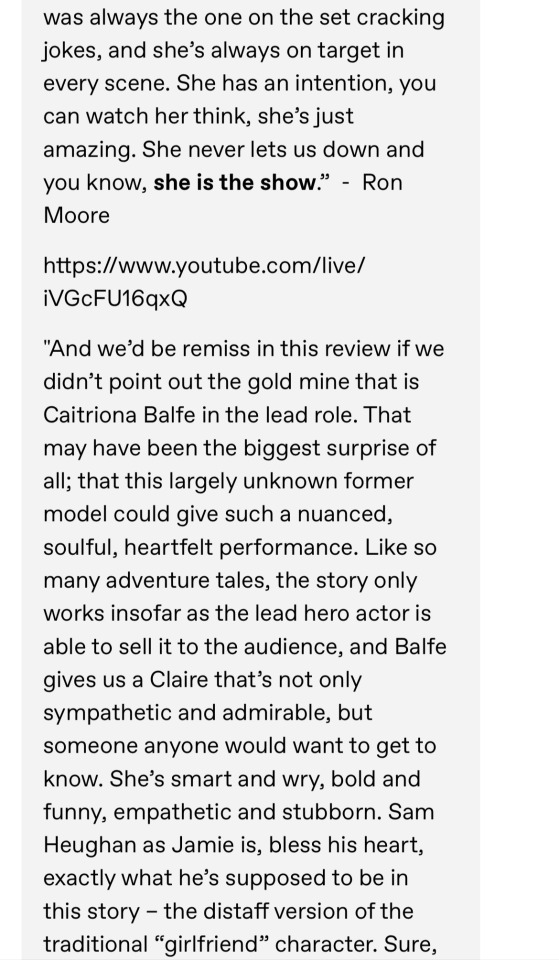
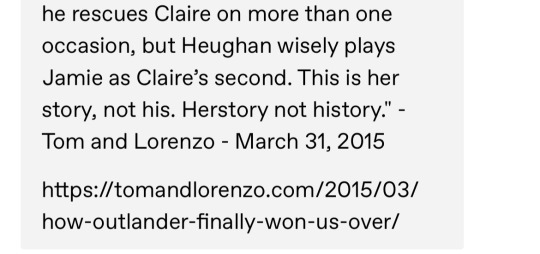
Thanks for the message, Anon. 😃 Are you quite sure someone said Caitríona was the weakest link in Season 1? How interesting. The Golden Globe Awards nominations committee must have been very hard up that year. 🤷🏻♂️
Here’s a clip from the 2015 Gold Derby video you quote:
Video 📹 clip from YouTube
I’m glad you included the 2015 bit from Tom & Lorenzo because the link refuses to cooperate with me. I imagine a lot of people who read the entire quote would see fightin’ words, but… “second” is an intriguing counter to “the weakest link,” is it not? 🤔

Galway 🇮🇪, November 2024 Instagram
Remember… Balfe gives us a Claire that's not only sympathetic and admirable, but someone anyone would want to get to know. She's smart and wry, bold and funny, empathetic and stubborn. Tom & Lorenzo
#Tait rhymes with hat#Good times#Inbox#Anonymous x 3#Caitríona Balfe#Outlander#Performance#Glamour#1 December 2024#YouTube#27 May 2015#Tom & Lorenzo#31 March 2015#Received 30 November 1&3 December/Responded 3 December 2024
27 notes
·
View notes
Text
Walking With Dinosaurs 2025: “we think our audience is stupid”
This is not a complimentary review. Beware of misery and spoilers.
In short, all issues circle back to the programme not trusting the audience to get it. Same as a lot of modern film. Explain the joke. Screw nuance. Show your workings. Give an excruciatingly big, face-scrunching wink! It’s dumbed down, not simplified. There’s a cavernous difference.
Let’s get visuals out of the way. Obviously, they’re not groundbreaking. But I’m not going to linger on CGI quality - to me, that’s a secondary issue to pacing/plot/legibility/accuracy/entertainment/etc. That’s just lack of budget. I hope. So put that to the side while the bigger problems take centre stage.
I wasn’t expecting it to be a perfect replica. The original came out in 1999. New facts, new discoveries, new shebang. But if you’re going to base your appeal on it being a sequel of the OG dinosaur documentary, you need to pay at least a token gesture of respect. But it has sod all to do with the old one, aside from the title. Not in format, not in series layout, not in scripting. Not even an updated rendition of the iconic intro.
Missed chance for easy brownie points.
Speaking of format. Personally, I’m really, really not a fan of the modern day dig site cutaways. Not because I don’t want to see that - I bloody do, I want to see every bit of it. I want to see these talented, dedicated humans teach me something new, leave me in awe. Give me a whole programme of that! But I despair of it here on 2 big points.
1: it irretrievably breaks the pacing—and immersion
The beauty of the original was that it was immersive from start to finish. The lack of stop-start means you can get invested in the animals. There weren’t cutaways to dusty dig sites and intelligent people standing around a fossil, pointing and nodding for the camera’s benefit. You saw a dinosaur story based on modern science, and the script/story/visuals trusted you to follow without handholding or storyboarding. What starts as charming in the 2025 rendition becomes quickly irritating.
2: why show dinosaurs when we can kill time with sod all
The real life cutaways are set up to eat time rather than showcase exciting discoveries or professionals at the top of their game. Take Spinosaurus teeth. Conical. Wiggly fish-stabbers. Cool. All that needs in the script is something like a “At first glance, Spinosaurus teeth might not be fearsome bone-crushers like Tyrannosaurus Rex, or flesh-shearing blades like Carcharodontosaurus—but they’re perfectly adapted for snaring their elusive prey.“ Or something similar written by a documentary expert. Cut to Sobek hunting Onchopristis. Ta da. Instead we get a whole modern section of paleontologists finding a tooth, talking about how crocodilian it is, but then never actually explaining why that shape is efficient at catching and holding slippery, thrashing prey. Even if they had, instead of showing the facts at work with the dinosaurs, the palaeontologists are filmed talking about it instead.
Masterclass of tell, don’t show.
These are clever, specialised experts who know their shit. If you insist on cutting to them every 5 minutes, let them tell us something new, not force the poor buggers to give a paint by numbers stilted lecture.
Why not do as many other modern BBC nature documentaries have done, and have the nature documentary on first, then a “behind the scenes” feature with all the real-life work at the end? Instead of this clunky, tedious Frankenstein effort of people trying to look dramatic flying a drone or pretending it never occurred to them before this exact moment that Spinosaurus’s sail may have been used in threat displays. It’s insulting to the audience and the palaeontologists.
Somehow making a dinosaur dig site boring is quite the achievement, I suppose.
The “treating the audience like morons” theme pervades the entire script. It’s stunted and prescriptive, despite Bertie Carvel’s seemingly sincere efforts in making it compelling. Constantly telling the audience what to think instead of setting the scene, dropping facts and trusting us to have the grey matter to understand.
The original was refreshingly bereft of faux theatricality. It wasn’t overtly contrived or exaggerated. Never mind the dinosaur liberties taken in the new one (baby Triceratops dodging a biting Tyrannosaurus on repeat like a Marvel movie because “she’s nimble?” Give me strength.) And god help the eye-rolling cliches, fuck me. I dread to think how many times the line “but danger is never far away” gets used. Could be a good drinking game.
To be clear, I am not a paleontologist. I like dinosaurs, I’ve watched a lot of documentaries and read some books and papers. I’m a sad, wet enthusiast, nothing respectable. But there’s nothing here that made me sit up and go “holy shit.” There’s material in here presented as ground breaking that I recognise from 2011’s Planet Dinosaur, for god’s sake.
Ultimately, this isn’t a sequel to Walking With Dinosaurs. It’s not even an homage. It’s a “that’ll do” dinosaur programme making convenient use of an iconic title. It would’ve been better off standing alone rather than piggybacking off the original, in which it disappointingly falls off the wagon and just looks silly for the effort.
Worth a watch? Sure, if you’re really keen and starved for paleocontent. Easily better than Dinosaur Fight Club or whatever “is Megalodon still alive” bollocks occasionally eating air time. A worthy successor to the Walking With Dinosaurs mantle? Let’s cutaway to my workings…
…
No.
#walking with dinosaurs#walking with dinosaurs 2025#walking with dinosaurs 2025 is mid#at best#not a worthy successor#I’m devastated#I was so excited#had it in my calendar and everything#I wanted so so so badly to love it I really did#not my usual content
14 notes
·
View notes
Text
The queer artists in the Eurovision 2025 grand final
New Post has been published on https://qnews.com.au/the-queer-artists-in-the-eurovision-2025-grand-final/
The queer artists in the Eurovision 2025 grand final

There are some fierce queer competitors among the 26 acts competing in this weekend’s Eurovision grand final.
The extravaganza that is the Eurovision Song Contest comes to a dramatic conclusion on Sunday morning (Australian time).
Among the 26 acts fighting it out for victory are a numbers of queer with some strong contender among them.
We go through the confirmed out LGBTQIA+ artists who made the grand final, plus those who didn’t qualify.
Be warned, there are spoilers ahead!
JJ from Austria
youtube
JJ, aka Johannes Pietsch, is a 23-year-old male soprano singer from Austria.
He is of Austrian-Filipino descent and was previously best known for competing on The Voice UK, where he made it through to the knockout rounds.
This year, he performs Wasted Love and is among the favourites to take out the competition.
As a teenager, he lived in Dubai, which is where he first heard about Eurovision thanks to Conchita Wurst’s victory.
“Conchita’s performance caused such a stir that it was also reported in Dubai, where I grew up. And there it was a huge taboo subject if you were part of the queer community,” he told Euro News.
JJ is proud to bring his queerness to the Eurovision stage.
“I’m queer myself and I’m happy to represent the community and give it a voice,” he said
“I’m now, so to speak, the voice of the queer community in Austria and my personal message would simply be to love one another, because love is the most beautiful thing in the world and hate is the most terrible.”
Erika Vikman from Finland
youtube
The 32-year-old singer Erika Vikman came out as bisexual in 2020 after a separation from her longtime partner.
She is competing with the song ICH KOMME, which translates (in German) to I’m coming.
The song is in both Finnish and German and includes these translated lines in the chorus:
And before you come, I hear you screaming (I’m coming, I’m coming) And to that, I scream out loud, “I’m coming” (I’m coming, I’m coming) And together we come and be like (I’m coming, I’m coming) It’s like that when you fall in love
It has raised some eyebrows because of the clear subject matter.
Erika revealed she was forced to alter her costume as it was deemed too risque for Eurovision.
“They said it’s a bit too sexual. They want to cover my butt,” she said.
She is also a fierce advocate for the queer community stating:
“I am proud to be part of the queer community and to bring that energy to the Eurovision stage.”
Miriana Conte from Malta
youtube
Miriana has been one of the most talked-about entries this year.
After winning selection for Malta with her song Kant (Kant is the Maltese word for singing), she was forced to remove the word.
This came after complaints from some broadcasters that the line ‘Serving kant’ was too offensive for their viewers (we’re looking at you BBC).
She also revealed this year she revealed she has a girlfriend when on an Instagram Live with fellow artist Erika Vikman.
Miriana shared how her song had been received from the rainbow community.
“I think [the queer community] support us the most because they get the perspective, they get the message we’re trying to send,” she said.
Those who missed out on the Eurovision grand final
Unfortunately, not every queer artist made it out of the semi-finals.
These queer artists were:
Marko Bošnjak from Croatia
youtube
Marko Bošnjak made history as Croatia’s first openly gay musician.
He represented Croatia with his song Poison Cake which explored themes of forbidden love and self-acceptance.
Marko has spoken openly about the challenges he faced after coming out, and some of the negativity he experienced after winning Eurovision selection.
“Being the first openly gay musician here [in Croatia] made the burden of attacks fall on me,” he said.
“People lacked constructive criticism. They just wanted to hate on me without saying anything about the performance.”
When is Eurovision?
youtube
The Eurovision grand final is on Sunday 18 May at 5:00am AEST and will be broadcast by SBS.
Primetime replays will be shown of the semi-finals and the grand final over the weekend.
The coverage will be hosted by Courtney Act and Tony Armstrong.
All broadcast details below:
LIVE early morning broadcast on SBS and SBS On Demand
Grand Final – Sunday 18 May at 5:00am AEST
Prime time ‘Access All Areas’ event coverage on SBS and SBS On Demand
Semi-final 1 – Friday 16 May at 7:30pm AEST
Semi-final 2 – Saturday 17 May at 7:30pm AEST (Australia’s semi-final)
Grand Final – Sunday 18 May at 7:30pm AEST
For the latest LGBTIQA+ Sister Girl and Brother Boy news, entertainment, community stories in Australia, visit qnews.com.au. Find us on Facebook, Twitter, Instagram and YouTube.
9 notes
·
View notes
Text
Stage/Fright mention on Elaine Page on Sunday, BBC Radio 2, 30/03/25
No plot spoilers but I know there are people who are avoiding everything in the hopes that there will be an official DVD release and/or a tour that they can attend at a later date - so don't listen if you want to be completely in the dark about everything to do with the play.
Transcript below the cut.
Elaine: I had a brilliant nine to five working day the other day. I received an invitation from 'Masters of the Macabre' Steve Pemberton and Reece Shearsmith to make a one-off appearance in their West End show Inside No. 9 Stage/Fright.
Just like the long running TV series Inside No. 9, Steve and Reece and their wonderful supporting cast present a hilarious - it is just hilarious! - A sequence of sketches that go from the eerie to the absurd.
I don't wanna say too much about my role (chuckles) that of the "guest star" (chuckles), because I don't want to spoil it if you've got a ticket and you haven't yet seen it. But I will say that I was taken hostage in my dressing gown! (chuckles)
It was such a fun afternoon. And the boys and Kate, the company stage manager, and everyone I met backstage looked after me so brilliantly. Nevermind Inside No. 9 - I was on cloud nine!
If you want to see Inside No. 9 Stage/Fright, well, you'll have to be quick because its limited run at the Wyndham's Theatre ends on Saturday. And actually it's sold out, but you might be lucky and get a return. It's so worth it.
7 notes
·
View notes